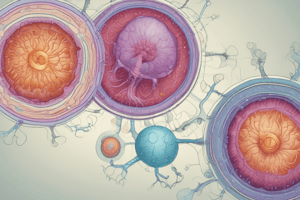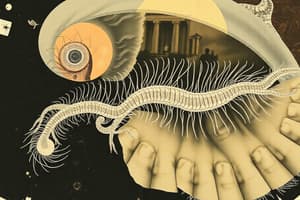Podcast
Questions and Answers
The science deals with the topics concerning gamete formation (gametogenesis), a fusion of gametes (fertilization), and embryo formation (__).
The science deals with the topics concerning gamete formation (gametogenesis), a fusion of gametes (fertilization), and embryo formation (__).
embryogenesis
Gametes constitute __ or sperms.
Gametes constitute __ or sperms.
ova
Mesenchymal stem cells turn into __, fat, muscle, and cartilage cells.
Mesenchymal stem cells turn into __, fat, muscle, and cartilage cells.
bone
Neural stem cells differentiate to __, glia, and other similar cells.
Neural stem cells differentiate to __, glia, and other similar cells.
Hematopoietic stem cells(adult) are found in __ and immune system.
Hematopoietic stem cells(adult) are found in __ and immune system.
The study of chordate embryology deals with the topics concerning gamete formation, a fusion of gametes, and embryo formation (______).
The study of chordate embryology deals with the topics concerning gamete formation, a fusion of gametes, and embryo formation (______).
Birth defects can occur during the process of ______.
Birth defects can occur during the process of ______.
Totipotent cells are more ______ than multipotent cells.
Totipotent cells are more ______ than multipotent cells.
In mammals, gametes are involved in the formation of ______.
In mammals, gametes are involved in the formation of ______.
Hematopoietic stem cells are found in the ______ system.
Hematopoietic stem cells are found in the ______ system.
Study Notes
Chordate Embryology
- Dealing with the topics of gamete formation (gametogenesis), fusion of gametes (fertilization), and embryo formation.
Gamete Formation
- Gametes: ova or sperms.
- Not versatile like totipotent cells.
Stem Cells
- Types of stem cells:
- Mesenchymal stem cells: found in bone marrow, fats, and other tissues; can differentiate into bone, fat, muscle, and cartilage cells.
- Neural stem cells: can differentiate into neurons, glia, and other similar cells.
- Hematopoietic stem cells (adult): found in blood and immune system; can be induced to become other cell types.
Embryology Importance
- Studies of embryology can help understand and prevent birth defects.
Chordate Embryology
- Dealing with the topics of gamete formation (gametogenesis), fusion of gametes (fertilization), and embryo formation.
Gamete Formation
- Gametes: ova or sperms.
- Not versatile like totipotent cells.
Stem Cells
- Types of stem cells:
- Mesenchymal stem cells: found in bone marrow, fats, and other tissues; can differentiate into bone, fat, muscle, and cartilage cells.
- Neural stem cells: can differentiate into neurons, glia, and other similar cells.
- Hematopoietic stem cells (adult): found in blood and immune system; can be induced to become other cell types.
Embryology Importance
- Studies of embryology can help understand and prevent birth defects.
Studying That Suits You
Use AI to generate personalized quizzes and flashcards to suit your learning preferences.
Description
This quiz covers the basics of chordate embryology, including gamete formation, fertilization, and embryo development. It also touches on topics like birth defects and the characteristics of mammalian gametes.



